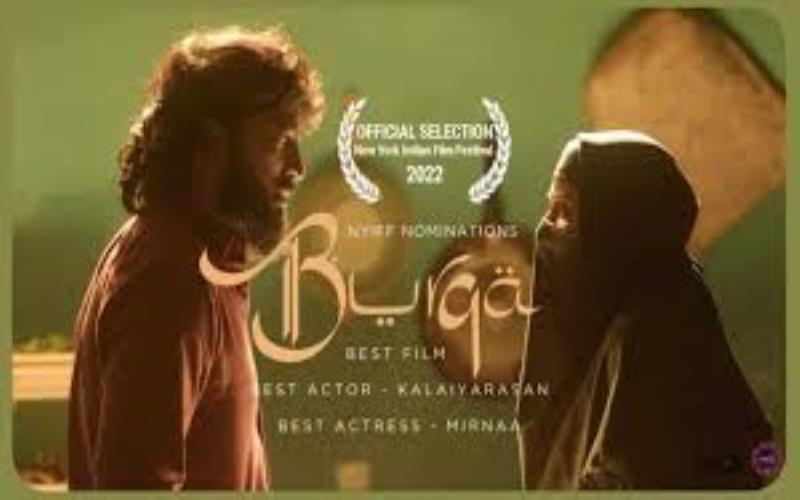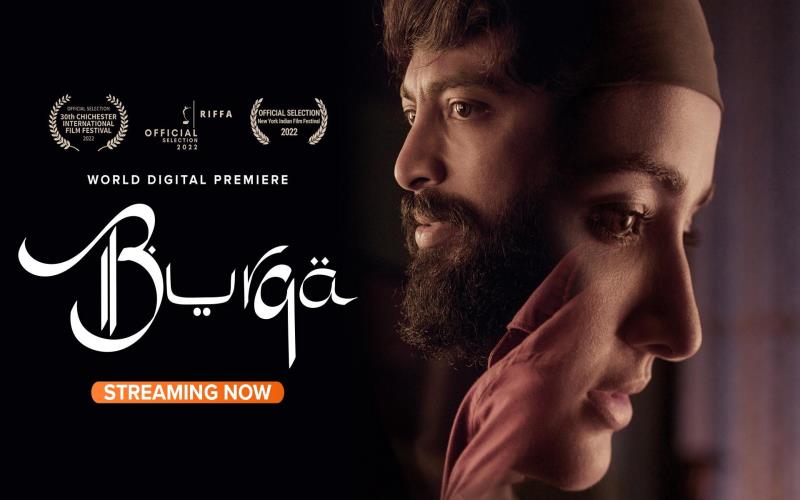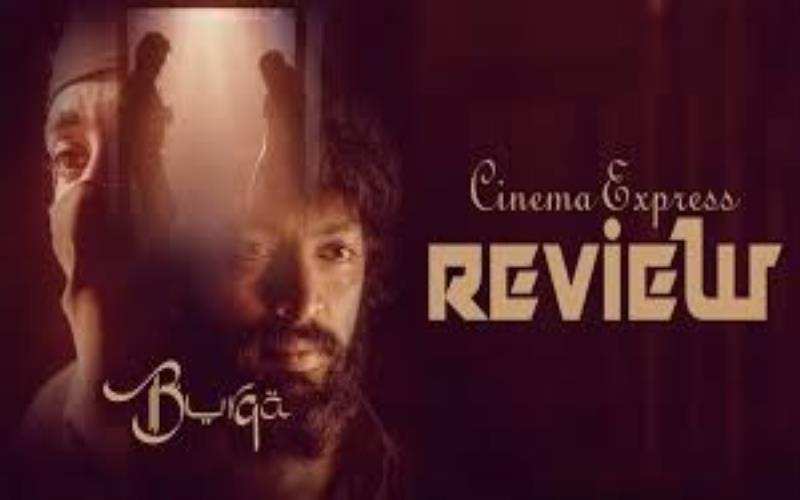
Burqa is a 2023 Indian Malayalam-language drama film directed by S. A. Chandrasekhar, known for his ability to weave intense narratives about societal issues. The film delves into themes of religion, identity, and social norms, set against the backdrop of a contemporary society where conservative beliefs often clash with individual freedoms. The title itself, referring to the traditional garment worn by some Muslim women, acts as a metaphor for the constraints society imposes on its people.

The story explores the life of Zainab, a young woman struggling with the expectations placed on her by both her family and society. Burqa becomes a symbol of societal control, personal identity, and a vehicle for the film’s deeper commentary on the role of women in a patriarchal world. The film portrays Zainab’s journey as she grapples with the challenges of balancing her personal desires with the norms she is expected to follow.
Despite being a film that tackles a sensitive subject matter, Burqa is also an exploration of empowerment and the freedom of choice. With a compelling narrative, strong performances, and a fresh perspective, Burqa quickly became a talking point among cinema lovers and critics alike.

Honest Review
Plot and Direction
The narrative of Burqa centers around Zainab (played by Parvathy Thiruvothu), a young woman from a conservative Muslim family. As a child, she is taught to respect traditional values, particularly the significance of the burqa, which her mother insists she wear as a symbol of modesty and respect. However, as Zainab grows older, she begins to question the meaning of the burqa in her life. She finds herself conflicted between the idea of personal freedom and the societal pressures to conform.
As she navigates her journey, Zainab falls in love with Sami (played by Fahadh Faasil), a man who challenges her understanding of faith, identity, and freedom. Their relationship faces numerous challenges, primarily due to the strict cultural and religious norms that Zainab is expected to uphold. Her family, especially her father (played by M. S. Bhaskar), disapproves of her choices, and the societal judgment intensifies as Zainab’s personal choices begin to clash with the traditions she was raised with.
Director S. A. Chandrasekhar delivers a powerful story, drawing attention to the deeper themes of self-expression, identity, and the importance of individual choice in a world that often demands conformity. The director does a commendable job of sensitively handling the cultural nuances of the subject matter without being overly preachy. The slow-burning narrative adds weight to Zainab’s internal struggles, and the pacing, while deliberate, helps emphasize her emotional transformation.
Performances
Parvathy Thiruvothu delivers an outstanding performance as Zainab. Known for her ability to portray complex characters with depth and vulnerability, Parvathy brings authenticity and emotional resonance to her role. Her portrayal of a woman torn between her family’s expectations and her own desires is heartfelt and relatable. Parvathy’s nuanced performance is one of the key reasons the film’s emotional depth succeeds.
Fahadh Faasil, playing Sami, complements Parvathy’s performance with his own restrained yet effective portrayal of a man who encourages Zainab to question the world she lives in. His chemistry with Parvathy is electric, adding an extra layer of tension to their already tumultuous relationship.
- S. Bhaskar as Zainab’s father plays a pivotal role in the film. As a traditionalist who believes in preserving cultural practices, Bhaskar brings a level of authority and conviction to his character. His portrayal is both sympathetic and stern, which adds to the emotional conflict Zainab faces.
The supporting cast, including Ravi Krishna and Shweta Menon, contributes solid performances that provide a deeper context for the characters’ lives and dilemmas.
Cinematography and Visuals
The cinematography of Burqa, handled by K. S. Chithra, beautifully captures the emotional landscape of the film. The use of light and shadow plays an important role in the visual storytelling, with the dark hues representing the constraints and emotional weight Zainab feels. The juxtaposition of light symbolizes moments of clarity and emotional freedom, reflecting her internal journey.
The camera angles and composition effectively emphasize the emotional subtleties of the characters, particularly Zainab’s moments of self-reflection. The film’s visual style enhances its themes, immersing the audience in Zainab’s world and her battle between personal freedom and societal expectations.
Music and Background Score
The music of Burqa, composed by G. V. Prakash Kumar, plays a significant role in amplifying the emotional intensity of the film. The score complements the narrative, using a mix of haunting melodies and intense background music that resonates with the film’s themes of oppression and self-liberation.
The soundtrack is minimalist but impactful, with songs like “Puthu Kaalai” and “Chinnam Thani” capturing the mood of the film perfectly. The music underscores the film’s dramatic moments, adding to its emotional impact and making certain sequences stand out.
Cast
Parvathy Thiruvothu as Zainab – The protagonist, struggling between family expectations and personal desires.
Fahadh Faasil as Sami – Zainab’s love interest, whose progressive views challenge her perception of life.
- S. Bhaskar as Zainab’s father – A traditionalist who believes in upholding cultural practices.
Ravi Krishna – Supporting character who adds layers to Zainab’s personal life.
Shweta Menon – A pivotal supporting role that brings context to Zainab’s choices.
IMDb Rating
On IMDb, Burqa holds a solid rating of 7.5/10, reflecting generally positive reviews from critics and audiences. The film’s heartfelt performances and sensitive treatment of difficult subjects were widely praised. Parvathy’s stellar portrayal of Zainab, coupled with Fahadh Faasil’s compelling performance, contributed significantly to the film’s positive reception.
However, some viewers felt the film’s pacing was slow at times, which could detract from its overall impact. Nonetheless, the film’s emotional core and thematic depth received widespread acclaim, with many viewers praising its ability to spark conversations about societal norms and women’s rights.
Budget and Box Office Success
Burqa was made on a budget of approximately ₹18 crore, with a considerable portion of the budget directed towards securing talented actors, high-quality cinematography, and a well-crafted musical score. While not a high-budget commercial film, the production values are on par with other Malayalam dramas, and much of the film’s strength lies in its storytelling and performances rather than extravagant visuals or action sequences.
At the box office, Burqa grossed approximately ₹35 crore globally, making it a moderate success. While it didn’t achieve blockbuster status, the film’s success can be attributed to its topical subject matter, strong word-of-mouth, and a loyal fan base for both Parvathy and Fahadh Faasil. The film performed particularly well in Kerala, where it resonated with viewers due to its focus on personal identity, societal constraints, and the battle for individual freedom.
Despite the niche subject matter, Burqa found success with both critics and audiences, who appreciated its emotional depth and powerful performances. The film’s success was also bolstered by its wide release in international markets, where it was lauded for its universal themes of self-liberation and cultural conflict.
Conclusion
Burqa is a poignant, thought-provoking drama that tackles complex issues surrounding identity, freedom, and societal expectations. Directed with sensitivity and depth, it features some of the best performances in recent Malayalam cinema, particularly from Parvathy Thiruvothu, whose portrayal of Zainab is nothing short of exceptional. The film’s slow, reflective pace allows for a deep dive into the emotional and psychological aspects of its central character’s journey.
While Burqa may not appeal to everyone due to its deliberate pacing and niche subject matter, it remains a powerful narrative about self-empowerment and breaking free from the chains of tradition. Its modest success at the box office and positive reception on IMDb are a testament to the film’s resonance with audiences, particularly those seeking stories that explore the complexities of human relationships and societal norms. For anyone looking for a compelling drama that delves into important social issues, Burqa is a must-watch.